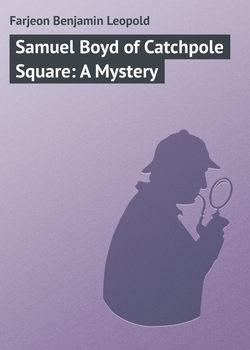Читать книгу Samuel Boyd of Catchpole Square: A Mystery - Farjeon Benjamin Leopold - Страница 4
CHAPTER IV
SILENCE REIGNS
ОглавлениеWas it indeed a grave, and were the phantom shapes thrown upon the walls and ceiling by the flickering light the phantoms of the dead that were buried there? How easy to imagine this-how easy to imagine that, animated by a spirit of revenge for past wrongs and injuries, they moved and shifted, and glided hither and thither, and took fantastic and monstrous form, for the purpose of striking terror into the heart of the enemy who had filled their lives with suffering and brought them to an untimely end!
Silence reigned.
Were those shapes and forms the only phantoms in the lonely house? Or, in the spaces that were unlighted-say in the passages and on the stairs leading to the room in which its owner transacted his business, and into another room in which he slept-were other phantoms moving, as dumb as they, as silent as they, with thoughts as murderous and with power more sure? This phantom, now, unseen by reason of the darkness, pausing with finger at its lips, all its senses merged in the sense of hearing as it listened for a sound to warn it that the time was not yet ripe? Had this phantom escaped from the lighted room in fear lest, were it visible to mortal eyes, its dread purpose would be frustrated, and that a frenzied cry ringing out upon the air, might reach some chance and aimless wanderer, and thus mar the murderous design lurking in its breast? Even of this the risk was small, for rarely indeed did any such wanderer find himself in Catchpole Square, or any man, who, being there without design, did not gladly and quickly grope his way out of it. The very guardians of the night avoided it, and contented themselves with the slightest and swiftest scrutiny, as of a place which bore an evil reputation and had best be left alone. It happened at odd times that some houseless and homeless vagrant, slinking in, curled himself up in a dark corner and dozed till daylight came, creeping away then with no feeling of gratitude for the shelter it had afforded him. Once a hapless child, sleeping there during a fierce snowstorm, had been found dead in the morning, covered with a white shroud. But that was long ago.
But this one phantom was in the house-now pausing, now creeping slowly along, now pausing again, now crouching with its head against a panel, and so remaining for many dumb minutes. And another phantom was at its heels.
And when the lights were out, and the rooms, like the stairs and passages, were in darkness and the master in his bed, they were still there. So stealthy were their movements that no sound proceeded from them; their breathing was so faint that it would scarcely have disturbed a wintry leaf.
Silence reigned.
The sobbing and the moaning of the wind continued. Could it have carried the news to the wider thoroughfares, trodden by men and women whose business or pleasure kept them out so late, what message would it have conveyed? In its whispering voices would the word MURDER have found a place?
At no great distance from the Square stood Saint Michael's Church, its clock proclaiming the hour.
Ten!
Eleven!
Twelve!
How long these hours took to strike! A measured pause between each stroke, and in that pause the passing away of a life in the life of the great city, or the ushering in of one. This life at an end, this with a feeble cry at the journey before it.
One o'clock!
Samuel Boyd was asleep. No prayer on his lips, no prayer in his heart, before he retired to rest. He slept in peace, undisturbed by fear or remorse.
Suddenly he awoke. His heart beat wildly, a cold perspiration broke out on his forehead.
With a powerful hand pressed upon his mouth, and another at his throat, no man can cry aloud. But while strength remains he can gasp, and moan, and fight for dear life-and may struggle out of bed, still with the hand upon his mouth, and another at his throat-and may summon to his aid all the despairing forces of his body-nay, even while thus imprisoned, succeed in dragging his adversaries this way and that-and may in his agony prolong the execution of the ruthless purpose. Though not avert it.
The door between the two rooms is open while this muffled struggle is going on. Furniture is overturned and displaced, tapestry torn from the walls, and smaller articles tossed in all directions. On the part of one of the men there is displayed a cold, cruel, relentless method in the execution of his design; on the part of the other a wild, despairing effort to obtain possession of a weapon. He succeeds. A pistol is in his hand.
A shot rings out! Another! – and the wax figure of the Chinaman collapses into a chair with a bullet in its heart.
Again Saint Michael's Church proclaims the hour.
Two o'clock!
Silence reigns.
